He’s back
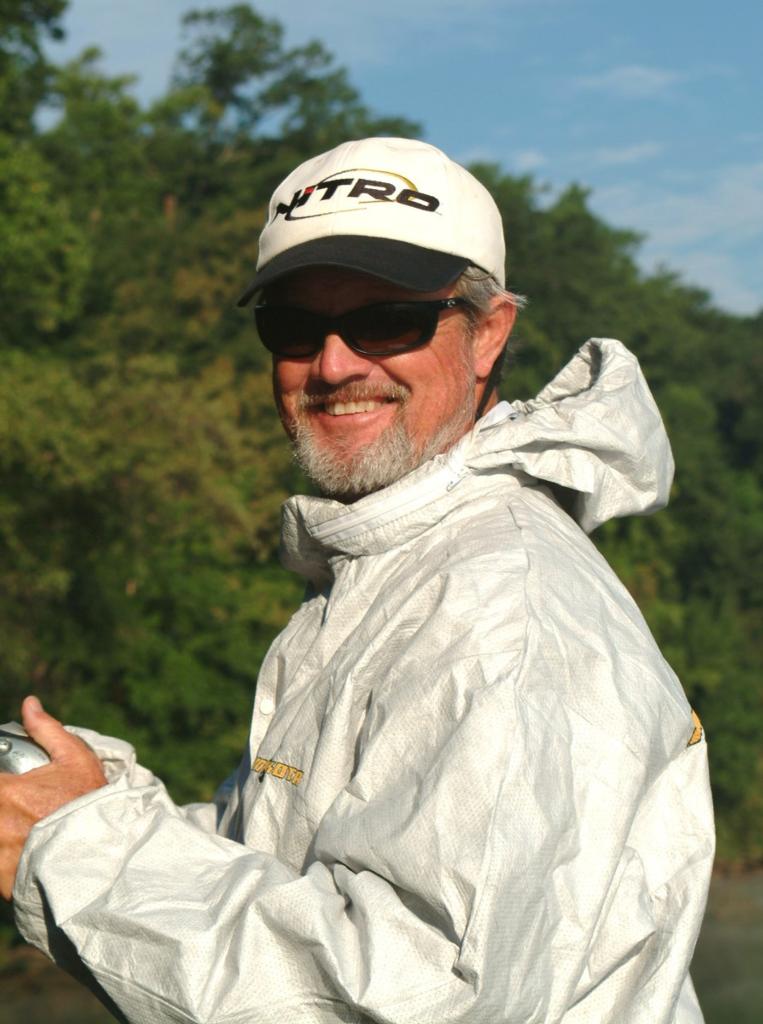
Thirteen years after remarkable Bassmaster Classic win, Rick Clunn returns to James River seeking another surreal victory
RICHMOND, Va. – In August 1990, Rick Clunn of Ava, Mo., mounted a come-from-behind Bassmaster Classic win so dramatic that it’s an indelible part of tournament bass-fishing history.
On the first day of that memorable event, he caught four bass weighing 6 pounds, 14 ounces. On the second day, he improved his catch with a 9-pound limit, but he was still nearly 10 pounds behind the headliner, Tommy Biffle, who was blowing the field away with a 7-pound lead.
Sitting in 10th place, Clunn was merely an afterthought as the potential champion.
On the final day, however, Clunn brought the Richmond crowd to their feet and shocked the bass-fishing world when he brought in 18 pounds, 7 ounces – an unheard of string of bass for the James River in August – to win by a 7-pound margin.
Clunn’s victory in 1990 is historical in the annals of bass fishing because Clunn once and for all proved to the world that tournament bass fishing was a sport of human performance – not just luck or a wager on a bass’ behavior.
Throughout the 1980s Clunn had been developing a notion that superhuman performance was possible in tournament bass fishing. If a golfer, tennis player or major league home run hitter could get in “the zone,” then why not tournament bass anglers?
Clunn delved into the study of spectacular sports performances from home run hitters to Olympic athletes. He read detailed accounts of great scientific discoveries: Edison and the light bulb, Einstein’s Theory of Relativity.
 He began to see a common denominator among these amazing accomplishments: The people that achieved them were in “the zone,” that magical place of dynamic perfection where everything goes right and nothing goes wrong.
He began to see a common denominator among these amazing accomplishments: The people that achieved them were in “the zone,” that magical place of dynamic perfection where everything goes right and nothing goes wrong.
Like other athletes, Clunn began experimenting with visualization, meditation and Zen. Some viewed Clunn’s ideologies as hogwash. After all, this was bass fishing, not archery. How could you be the bass?
But, deep down, Clunn knew the zone existed in bass fishing because he had experienced it before. For brief periods of time in his tournament fishing he knew he had experienced fishing perfection the way Tiger Woods experiences golf perfection.
He began talking publicly about his belief in superhuman fishing performance after his 1984 All-American and Bassmaster Classic wins. “There are no limits” became his credo – he had it sewn on the back of his shirt.
Clunn’s 18-pound, 7-ounce catch on Aug. 25, 1990 was his thesis on superhuman performance in bass fishing. To him there has never been any doubt that, by pushing mental and physical limits, one can achieve a special spiritual zone where there are no limits – even in competitive bass fishing.
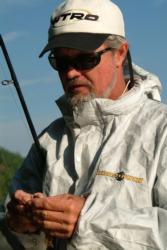 This week the abstract angler has returned to the place where the magic happened – the James River – to see if he can find that magical zone again during the FLW Tour Championship.
This week the abstract angler has returned to the place where the magic happened – the James River – to see if he can find that magical zone again during the FLW Tour Championship.
Except this time the stakes are higher. Clunn will be fishing for another zero – not as in zero fish, but as in another zero on the first-place prize. In 1990, Clunn won $50,000 for his Classic win. This week he will be angling for $500,000 in the FLW Tour Championship.
While combing the waters of the James River for bass during practice this week, Clunn recounted that special day in August 13 years ago.
“It was surreal, supernatural,” he said. “It’s like we (he and his press observer) were on a completely different body of water, far from everyone else. We hardly saw another boat, and I can remember thinking how the tide stayed low all day. Yet, when we got in, everyone was complaining about how high the tide was.”
Another mysterious aspect of Clunn’s day was that he never caught a small fish. Out of the dozen or so fish he caught, all were solid keepers.
“I never caught a nonkeeper,” he said. “That’s what’s so incredible. Nearly everything I caught was between 2 and 4 pounds. I was culling near 3-pounders on the James River.”
To this day Clunn says he has never experienced being in the zone for as long or as intensely as he did that day.
“It was beautiful,” he said. “There was no negativity whatsoever the entire day. Even when I backlashed or got the bait hung up, it was somehow leading me to the next fish. All of my rationality, expectation and judgment evaporated. I just knew where the next fish was before I made the cast. All negatives were gone – I was touching perfection.”
The spot where he caught the fish is also special to him.
“It’s a magical place,” he said. “On a microcosmic scale, it’s a very primal place. There’s no evidence of man at all.”
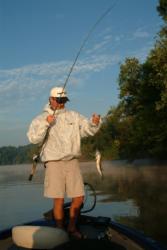 Of course, those of us in a more material world have one burning question: Has he been back to that place this week?
Of course, those of us in a more material world have one burning question: Has he been back to that place this week?
“The other day a bad thunderstorm came up and I went in there,” he reported. “I caught one nice fish and left. But the way the place is set up, some other things have to be working in order to really get the spot going, and those other things were not happening.”
Clunn did say he had one good practice day elsewhere. “My best day of practice, I caught 17 fish and probably could have weighed about 14 to 15 pounds. But the tide was absolutely perfect in there at that particular time, and it won’t be the same tide in the tournament.”
Other than that one good day, he says fishing has been typically tough for the James River, which he attributes that to the fickleness of tidewater bass.
“The tides will do some funny things,” he said. “It makes this such a timing deal. You can go down a bank on one tide and not get a bite, come back a few hours later on another tide and catch 12 pounds. This is one of the few places that I go back and check behind myself in practice. I hardly ever fish the same water twice in practice, but I do it a lot here.”
Clunn points out that being consistent on tidal water is difficult.
“This river system is capable of producing a big string but with no regularity,” he explained. “When I won in `90, my two previous days I caught typical James River weights. When Hank Parker won, he caught a big string the last day, too. Mike Auten caught a 20-something-pound bag of fish here in a BASS event but could not follow it up with another strong bag. So this place is known for being inconsistent.
“And that’s what is going to make this event so interesting,” he continued. “Because in this elimination-style format, you have to be consistent to get to the finals, and being consistent is the hardest thing to do here.
“In other FLW events, you can use a little strategy the first two days. You can manage areas, conserve fish and then go into maximizing mode the last two days. In this event, you have to be on your A game everyday. You have to maximize every day. If you start playing mind games with yourself about saving fish, you are playing Russian Roulette because you don’t know what that other guy is going to have.”
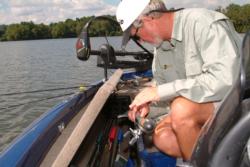 Another thing that bothers Clunn about the James River is that it often takes multiple presentations with different baits to get a bite. Clunn prefers to dial in on one lure and establish a fishing rhythm with that lure. It’s a style that’s not conducive to James River fishing.
Another thing that bothers Clunn about the James River is that it often takes multiple presentations with different baits to get a bite. Clunn prefers to dial in on one lure and establish a fishing rhythm with that lure. It’s a style that’s not conducive to James River fishing.
“I call it slop fishing,” Clunn said. “And Woo Daves is one of the best there is at it, which is why he is so good here.”
What Clunn means by “slop fishing” is assaulting a single piece of cover with five different lures and then finally getting a bite on the sixth one.
“I don’t understand why the fish are like that here,” he said. “I don’t know if it’s the tides, fishing pressure or what. But Woo will have a dozen different rods out on his deck and will catch a bass on every one of them.”
Speaking of Woo Daves, who is a very well-known pro angler from Spring Grove, Va., Clunn says he is treating his matchup against local angler John Crews of Jetersville, Va., as if he was fishing against Daves.
Even though Crews has not compiled any fishing titles in his young career, Clunn knows he has his work cut out for him.
“One of the phenomenons in professional sports is underestimating the competition,” Clunn said. “You ever wonder how a powerhouse team gets beat by a lesser team? It’s because they underestimated their competition. And I don’t want to underestimate Crews.”
Clunn does agree that Crews’ local knowledge on the James is going to serve him well.
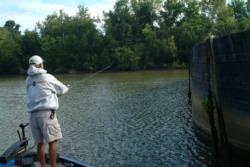 “That’s why I am viewing this like I am matched up against Woo,” he continued. “The hardest thing to do here is be consistent, and Woo has always been consistent here – he’ll always have his 8 to 10 pounds – because he knows this river. I assume Crews will be the same way. I know the chances are good that he is going to be consistent.”
“That’s why I am viewing this like I am matched up against Woo,” he continued. “The hardest thing to do here is be consistent, and Woo has always been consistent here – he’ll always have his 8 to 10 pounds – because he knows this river. I assume Crews will be the same way. I know the chances are good that he is going to be consistent.”
Recently, Crews remarked that he was glad to have two days to fish past Clunn. Ironically, Clunn views his matchup with Crews the same way.
“Since I tend to fish better each day of competition, it’s good to have two days to compile weight against him,” he said.
If Clunn does make the finals, he might once again get in the zone on the James River and bring the Greater Richmond Convention Center down with a spectacular catch on Saturday.
Related article: